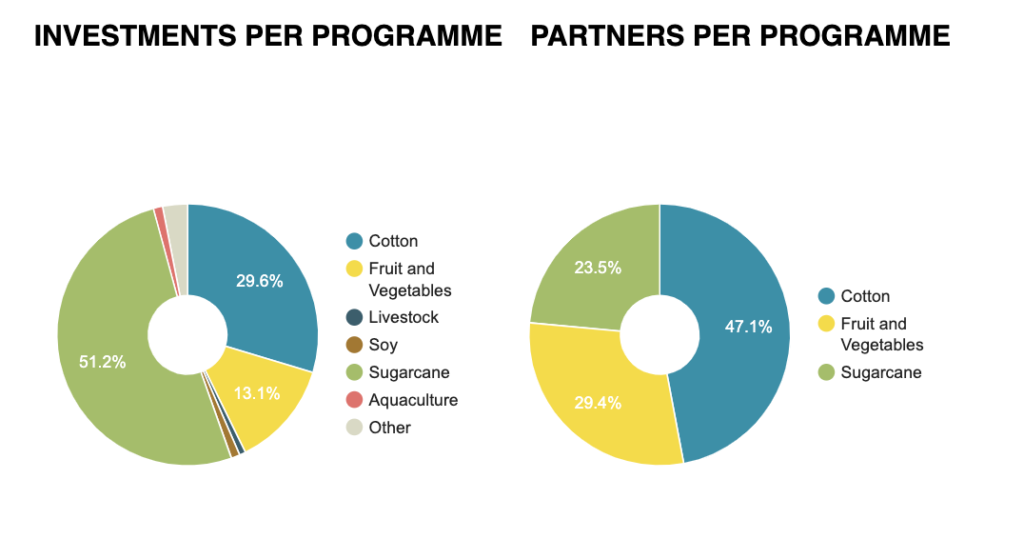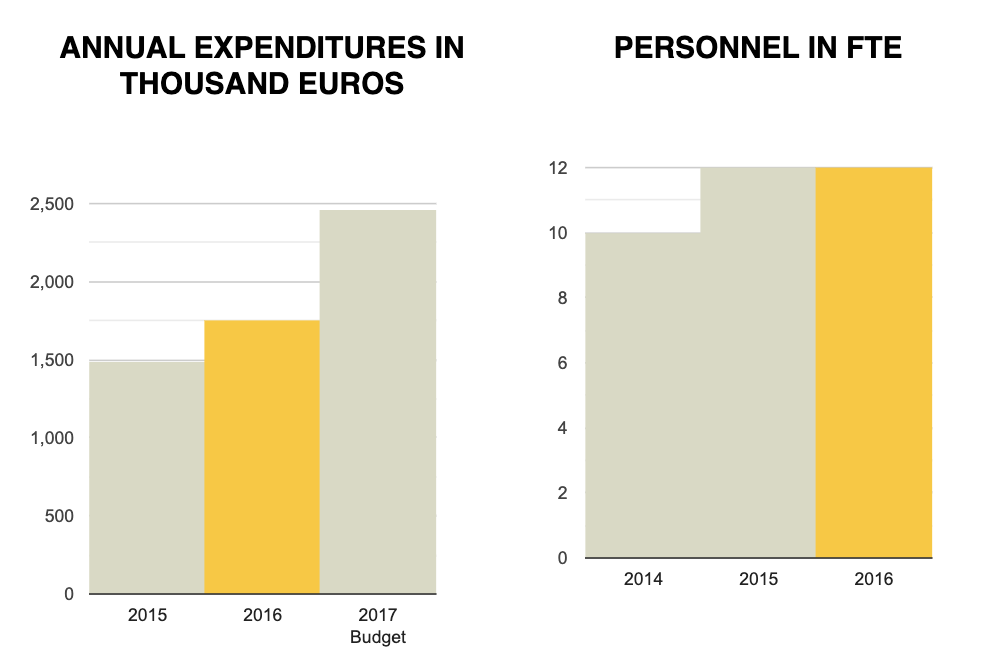Solidaridad expanded its network in Southern Africa, which helped build a stronger foundation for more collaboration. Together with partner JFS, Solidaridad further developed the project from implementation to innovation. In a cluster set-up, selected smallholder farmers now lease bigger plots of land and work together on sustainable practices such as crop rotation. Proposals for scaling up this concept are currently being developed with other potential partners.

In the dry northern part of Namibia, a total of 2,430 traditional livestock farmers were trained in rangeland and livestock management between 2013 and 2016. Selling cattle also improved through a scheme in which farmers were paid up to half of the value of the animals as an upfront loan to finance overhead costs. In cooperation with the local NGO Conservation Agriculture of Namibia (CAN), planned grazing was introduced to stimulate rotational grazing as a first and crucial step towards restoring balance in the environment.

Solidaridad identified that one of the major constraints to soy development in Southern Africa is the lack of availability of technology designed to fit the needs and capabilities of small-scale soy producers. Solidaridad worked on sector transformation by combining promotion of good agricultural practices and services provision, and by focusing on mechanization to enable smallholders to increase their production area.

DEVELOPMENTS
In 2016, Southern Africa experienced an El Niño-induced drought that crippled rain-fed agricultural production, making it the second consecutive poor rainfall season in the region. This only served to exacerbate the vulnerability of populations already negatively affected by the major global economic downturn in recent years. With a regional deficit of over 9.3 million tons of cereal in 2016, the price of staple food sources increased, restraining the already limited purchasing power of vulnerable families in rural areas.
Further compounding these challenges is the fact that Southern Africa is the second region in the world, after the Middle East and North Africa, to be faced with a debilitating water deficit. As climate change increasingly leads to infrequent precipitation, arable areas suitable for farming and grazing are becoming increasingly scarce in a region already characterized by variable rainfall.
Considering that the majority of the region’s arable agricultural land is in the hands of smallholder farmers, these farmers play a critical role in addressing the negative impacts of climate change, eradicating hunger, reducing rural poverty and improving global food security. While this is gradually being acknowledged by decision-makers and points, in theory, to a shift in Southern Africa’s development agenda, corruption and maladministration impede the implementation of policies aimed at promoting the sustainability of the smallholder sector.

ACHIEVEMENTS
The year 2016 was an exciting one as Solidaridad Southern Africa embarked, together with the Solidaridad Network, on the first stages of implementation of the new multi-annual strategic plan (MASP) for the period 2016 – 2020.
With the realities of climate change becoming increasingly evident, Solidaridad shifted the focus of its work to innovation areas that aim to achieve the speed and scale necessary to address these realities in the region.
Solidaridad worked with over 30,000 small-scale farmers across the region for the improvement of sustainable agriculture practices in their operations. In order to enhance and better facilitate the application of good practices, Solidaridad supported farmers in establishing over 1,200 producer groups and associations across commodities. this created aggregated purchase power and aggregated demand for services aimed at enhancing smallholders’ ability to farm sustainably.
The Southern Africa Partnership for Sustainable Cotton and Food Security (SAPSCAF) project tested the effectiveness of grouping farmers together in study circle groups, an approach that allowed for the distribution of 7,000 mobile phones to leading farmers. This enables a communication system that facilitates the swift and efficient distribution of information from implementing partner, OLAM, to farmers in Mozambique. OLAM will use the system to communicate critical information pertaining to expected rainfall dates, planting dates for various crops, loan status and information around market access and prices to farmers.

PARTNERSHIPS
Solidaridad works with a range of partners and donors in the region that have been central to its achievements in 2016.
In the cotton sector, Solidaridad was able to convene the Sustainable Cotton Cluster (SCC) together with partner Cotton SA, which has a long-term goal of making the region’s cotton production sustainable and benchmarked against the Better Cotton Initiative standard.
Solidaridad’s partnership with JFS in Mozambique has been instrumental in promoting climate-smart agriculture through a cluster model resulting in an average yield increase of over 100% among cluster farmers compared to non-cluster farmers. Solidaridad looks forward to strengthening its collaboration with other partners in Mozambique, including ETG, OLAM and INNOQ.
Work in the fruits and vegetable sector in South Africa includes partners such as WWF, Woolworths and government departments to establish a multi-stakeholder platform for enhancing sector-wide services for smallholder farmers.
Solidaridad’s work on barley production saw the launch of the Black Emerging Economic Development Project together with implementing partner, ICCO and co-funder Heineken and Soufflét, with grant support from RVO. This collaboration successfully facilitated a pilot in 2016 that has been crucial to refining the project moving forward.
In the sugarcane sector, Solidaridad has been collaborating with TSGro, Akwandze and the Water Research Commission on a project called ”Reducing the Water Footprint of Smallholder Farmers” with support from FDW.
ORGANIZATION
As a relatively new office, Solidaridad Southern Africa focused on consolidating its physical presence in the region. The appointment of Paulo Sousa and Angela Mulenga as Country Managers allowed Solidaridad to strengthen its presence in Mozambique and Zambia respectively.
Operations in the Mozambique and Zambia offices were further reinforced by the appointment of Celma Gomes and Dorothy Mwape as office administrators in the respective offices.
In the South African office, Lwandle Mthombeni was appointed as the new project finance officer and Veronica Fletcher was appointed as the new programme, monitoring and evaluation (PME) coordinator.
Solidaridad’s financial controller in the region, Wendy Matthews, completed a Master of Business Administration focusing on global information sharing with a case study done on the implementation of SalesForce. In addition, the new PME Coordinator completed a Master of Arts in Human Rights and Global Ethics with a focus on gender and environmental justice. Staff member, Koen Driven, was successfully shortlisted for his innovation proposal.
The internal training focused on improving the implementation of policies and procedures to streamline operations in the region. A large contingent of the Southern Africa team attended the launch of the Network’s new multi-annual strategic plan in Ghana in March 2016. In line with the Network’s new strategy, Solidaridad’s Deputy Director and Managing Director attended training on impact investment to ensure the Southern Africa office has the knowledge and skills to incorporate impact investment as an innovation area in its work.
Solidaridad staff also continued training on the Plaza system to facilitate efficient communication and data management.
